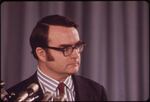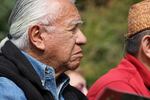Environmental elder statesman William Ruckelshaus may not have decided where to display the Presidential Medal of Freedom he will be receiving at a White House ceremony Tuesday.
But he has decided how to have a little fun with it.
"Well I've threatened my wife to wear it outside my suit coat in the daytime and inside my pajamas at night so it wouldn't hit her in the face when I turned over," joked the 83-year-old Ruckelshaus before admitting he really doesn't know what he'll do with the medal, one of 17 being awarded.
KUOW/EarthFix reporter Ashley Ahearn spoke with Ruckelshaus last week, before he departed for Washington, D.C.
The longtime Republican was the nation's first administrator of the Environmental Protection Agency under President Nixon.
Ruckelshaus is one of two Washington's environmental leaders who will be honored Tuesday by President Barack Obama. His friend, the late Billy Frank Jr. will be honored posthumously.
Frank died last year. He was an elder with Puget Sound's Nisqually Indian Tribe and a leader in the struggle by Washington's Native Americans to assert their treaty-bound fishing rights.
Here are some highlights from Ahearn's conversation with Ruckelshaus at his Seattle office.
On whether there are political undertones to his selection for the award:
"That's occurred to me that it may have been part of it. My understanding of the way this process works is that there is no process. The president gets nominations from a variety of sources and makes the choices himself. I would have thought there was a process that had been around for a long time that everyone went through but no, each president seems to be different."
On the way Republican candidates have been harsh critics of the EPA:
"There is a polarization of all kinds of issues in this country today and it's too bad, because issues like the environment — and the biggest manifestation of it now is the climate change issue — shouldn't be partisan issues. If we have a public health problem or an environmental problem, the science of it should be as rigorous as possible and the choices of what to do about it should be driven in part by science."
On why Republican won't actually follow through with their talk of abolishing the EPA:
"They can't, number one. And number two, if the issue of what to do about a toxic substance that is widespread in the environment … you have to balance the impact on costs and jobs and economy on one side, public health, the environment and need for government protection on the other. Those are very hard choices to make. You give those choices to the Congress, they'll give them back to the EPA as quickly as they can get rid of them because no matter what you decide you make somebody very angry."
On how environmental politics have changed since he led the EPA:

William Ruckelshaus was the first administrator of the EPA under Nixon and oversaw the initial implementation of the Clean Water Act. This photo was taken May 1972.
Courtesy of The U.S. National Archives
“During the late ‘60s, the early ‘70s we had ‘smell, touch and feel’ kinds of pollution. You could see the air pollution on your way to work in the morning. When I first moved to Washington the air was brown, mostly associated with automobile emissions. We had rivers that caught on fire like the (Cuyahoga) going through Cleveland, Ohio.
"Color television came into our homes in the middle '60s. A yellow outfall flowing into a blue river is a lot more impressive in color than it is in black and white. And those kinds of technical changes that moved into American living rooms had a huge impact on their impression of what was happening to the environment.
"Today these problems are much less visible, literally much less visible. So it's a different kind of problem and today it doesn't galvanize as much public demand that something be done as was true back in the 1960s. EPA is a victim of its own success. A lot of the changes in the air and the water have been a result of a pretty vigorous agency going after polluters."
On the environmental legacy of Billy Frank Jr.:

File photo of Billy Frank Jr. in 2011 at a ceremony for the removal of dams on Washington state's Elwha River. The well known fishing rights activist died in 2014 at the age of 83.
Katie Campbell / EarthFix
"He reminded me, and I wrote this when he died, more of Nelson Mandela than anybody I'd ever met. Here was a man who had been arrested more than 50 times asserting his treaty rights and finally vindicated by the Bolt Decision that was handed down in the early '70s. And he had suffered so much for asserting the rights that had been given by treaty and by court case that you'd think he'd be bitter about things.
"Quite the contrary. He was open, as happy a man as you could be around. He never held a grudge against anybody, was willing to forgive and forget, and use the position that he held and the admiration that people had for him, as leverage for getting things done for his tribe and other tribes in Puget Sound. He really was a remarkable human being."
What he thinks Frank would say if he were alive to personally receive the Medal of Freedom:
"Oh, he'd probably swear to begin with. He loved to swear. He didn't care who was in the audience or who was listening. No one was ever offended by it because it was just him, the way he talked. So he probably would start out with a couple of epithets but he would have been delighted by this and he'd have been delighted for the right reasons.
"The reason he'd enjoy this is because he wouldn't see it necessarily as given to him for what he had done but as an affirmation for the positions he had taken for tribesmen and tribes throughout the region. It was the kind of person he was. It's the reason a person like that would deserve an award like this."
On the biggest challenge facing Puget Sound today:
"It's called restoring the health of Puget Sound. What does that mean? The sources of pollution that go into the Sound need to be brought under control, the restoration of habitat for salmon and other species of fish in the Sound.
"the environment is not like a speed limit. It's not like telling somebody to put out a fire and then you can walk away from it because you've put it out. This is a problem you have to stay everlasting ahead because if you don't' do that, it begins to deteriorate again. In some ways it's discouraging but in other ways it's the way we have to live going forward."
On the possibility that he'll ever retire:
"Well I don't want to retire. I enjoy going to the office, working on a variety of things. I'm 83 years old so why retire? What am I going to do if I retire? Sit home and wring my hands about the environment. That won't do any good. So no, I'm not gonna retire."
Correction: Nov. 24, 2015. An earlier version of this story did not give the correct name of the award received by William Ruckelshaus, Billy Frank Jr. and 15 others. They are recipients of the Presidential Medal of Freedom.

KUOW/EarthFix reporter Ashley Ahearn and Seattle attorney William Ruckelshaus in 2012.
Katie Campbell, KCTS9/EarthFix